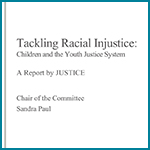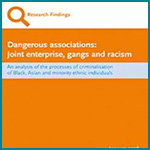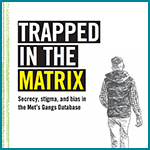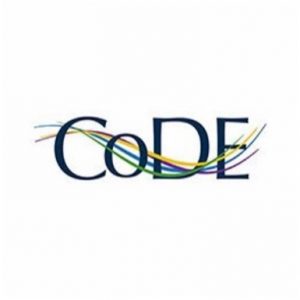
Research
Explore reports and scholarship on the criminalisation of rap and of young Black people, mainly focused on the UK. Learn more about Prosecuting Rap project events.
Scholarship
Publications
- Addo, F. (2022), ‘Resisting the Criminalisation of Rap’, Popular Music 41.4
- Bramwell, R. and Butterworth, J. (2020), ‘Beyond the Street: The Institutional Life of Rap’, Popular Music 40.3
- Clarke, R. and Williams, P. (2020), ‘(Re)producing Guilt in Suspect Communities: The Centrality of Racialisation in Joint Enterprise Prosecutions’, International Journal for Crime, Justice and Social Democracy 9
- Elliott-Cooper, A. (2021), Black Resistance to British Policing. Manchester University Press
- Fatsis, L. (2019), ‘Grime: Criminal Subculture or Public Counterculture? A Critical Investigation into the Criminalisation of Black Musical Subcultures in the UK’, Crime, Media, Culture 15
- Fatsis, L. (2019), ‘Policing the beats: the criminalisation of UK drill and grime music by the London Metropolitan Police’, Sociological Review 67.6
- Hallsworth, S. and Young, T. (2008), ‘Gang Talk and Gang Talkers: A Critique’, Crime, Media, Culture 4.2
- Gunter, A. (2017), Race, Gangs and Youth Violence: Policy, Prevention and Policing. Policy Press
- Ilan, J. (2020), ‘Digital Street Culture Decoded: Why Criminalising Drill Music is Street Illiterate and Counterproductive’, British Journal of Criminology 60
- Jalloh, T. O. (2022), ‘Does the Critical Scrutiny of Drill Constitute an Epistemic Injustice?’, British Journal of Aesthetics 62.4
- Keenan, M. and Paul, S., ‘The criminalisation of drill music: Should beats and bars be used as evidence in court?’ (2021), Entertainment Law Review 32.7
- MacLeod, N. (2021), ‘Art vs Craft’: Expert Evidence in the England and Wales Justice System’, Language and Law 8.1
- Monteith, K. and Quinn, E. et al (2022), Racial Bias and the Bench: A response to the Judicial Diversity and Inclusion Strategy (2020-25), University of Manchester, chrome-extension://efaidnbmnnnibpcajpcglclefindmkaj/https://documents.manchester.ac.uk/display.aspx?DocID=64125
- Monteith, K. (2022), ‘Ban rap lyrics in the courtroom’, Popular Music 41.4
- Oliver, A. (2023), Deeping It: Colonialism, Culture and Criminalisation of UK Drill, Inklings
- Owusu-Bempah, A. (2022), ‘The Irrelevance of Rap’, Criminal Law Review 2
- Owusu-Bempah, A. (2022), ‘Prosecuting Rap: What does the case law tell us?’, Popular Music 41.4
- Quinn, E. (2024), ‘Racist inferences and flawed data: drill rap lyrics as criminal evidence in group prosecutions’, Race & Class 65.4
- Quinn, E., Street, J., and White, J., eds (2022), ‘Prosecuting & Policing Rap’, special issue of Popular Music 41.4
- Quinn, E. (2024) ‘Propagating gang discourses via rap videos: Institutional racism in joint enterprise criminal trials’, British Journal of Criminology (forthcoming)
- Reisner, L. and Rymajdo K. (2022), ‘The 0161 rap gap: the marginalisation of Black rap musicians in Manchester’s live music scene’, Popular Music 41.4
- Scott, C. D. (2020), ‘Policing Black Sound: Performing UK Grime and Rap music under routinised surveillance’, Soundings 75
- Street, J. (2012), ‘From Gigs to Giggs: Politics, law and live music’, Social Semiotics 22.5
- Thapar, C. (2021), Cut Short: Youth Violence, Loss and Hope in the City. Penguin
- Ward, T. and Fouladvand, S. (2021), ‘Bodies of Knowledge and Robes of Expertise: Expert Evidence about Drugs, Gangs and Human Trafficking’, Criminal Law Review 6
- Williams, P. (2015), ‘Criminalising the Other: Challenging the race-gang nexus’, Race & Class 56.3
- White J. (2017), ‘Controlling the Flow: How Urban Music Videos Allow Creative Scope and Permit Social Restriction’, Young 25.4
- White, J. (2020), Terraformed: Young Black Lives in the Inner City, Repeater

Prosecuting Rap project events
Reports

Tackling Racial Injustice: Children and the Youth Justice System
A Report by JUSTICE, 2021.
52% of those in custody aged 10-17 are from a minority ethnic background, compared to 18% of the general population. This report identifies misunderstanding and misuse of Drill music as a factor that feeds the over-representation of Black children in the criminal justice system and makes recommendations to regulate its use as evidence.
 Dangerous Associations: Joint enterprise, gangs and racism
Dangerous Associations: Joint enterprise, gangs and racism
Patrick Williams and Becky Clarke, 2016
This groundbreaking report on the use of gang discourses in the creation of joint enterprise prosecutions includes case-study material on rap evidence. Rap evidence is used by prosecutors, in the place of facts, to produce a sense of racialized ‘dangerous network’ that opens pathways to conviction of alleged secondary offenders.

Trapped in the Gangs Matrix
Amnesty International (2018)
“In reality the Matrix overwhelmingly targets young Black men. They are often labelled as suspected gang members based on weak indicators – sometimes simply because they’ve been victims of gang violence themselves. Or for reasons as trivial as the music they listen to and the videos they watch online.”




